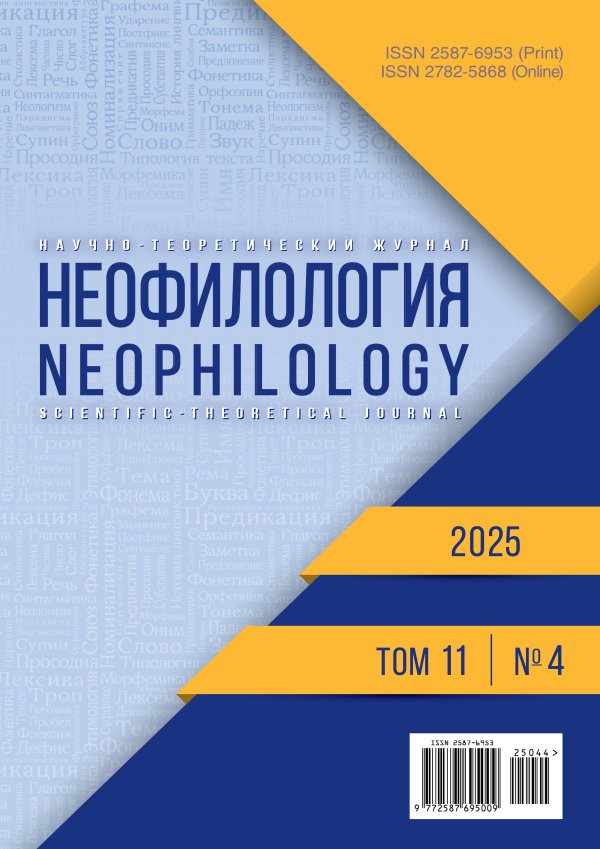Мессианские мотивы в творчестве поэтов Серебряного века (М.А. Волошин, А.А. Блок, С.А. Есенин)
- Авторы: Юдахин А.А.1
-
Учреждения:
- ОЧУ ВО «Московский университет им. А.С. Грибоедова»
- Выпуск: Том 11, № 1 (2025)
- Страницы: 98-111
- Раздел: ЛИТЕРАТУРНАЯ КАРТА В ЛИЦАХ, ФАКТАХ, СОБЫТИЯХ
- URL: https://journal-vniispk.ru/2587-6953/article/view/295478
- DOI: https://doi.org/10.20310/2587-6953-2025-11-1-98-111
- ID: 295478
Цитировать
Полный текст
Аннотация
ВВЕДЕНИЕ. Историософия составляет важный аспект творчества поэтов Серебряного века, в частности, М.А. Волошина, А.А. Блока и С.А. Есенина. Цель исследования – выявить и концептуализировать мессианские мотивы (в их различных проявлениях) в творчестве вышеназванных авторов в контексте российской истории первой четверти XX столетия.
МАТЕРИАЛЫ И МЕТОДЫ. Материалами исследования послужили стихотворения М.А. Волошина, А.А. Блока и С.А. Есенина, содержащие историософскую проблематику. В ходе исследования применялись сравнительно-исторический, культурно-исторический и системно-типологический методы анализа.
РЕЗУЛЬТАТЫ ИССЛЕДОВАНИЯ. Выявлено наличие парадигмы русского мессианства в творчестве М.А. Волошина, А.А. Блока и С.А. Есенина, имеющего свои характерные и оригинальные черты, такие как: антиномия и кенозис, освящённость и мистичность, христоликость, таИнственность и тАинственность Руси-России, её литургическая и иконическо-диафаническая природа, включённость русского бытия в библейско-мессианское измерение священной истории. Русское мессианство осмысляется названными поэтами как в его исторической, так и метаисторической проекциях.
ЗАКЛЮЧЕНИЕ. Выявленные описательные черты Руси-России (русское бытие, русская история, русская природа), представленные в стихотворениях М.А. Волошина, А.А. Блока и С.А. Есенина в историософской перспективе, позволяют говорить о присутствии идеи русского мессианства в творчестве вышеназванных поэтов.
Ключевые слова
Об авторах
А. А. Юдахин
ОЧУ ВО «Московский университет им. А.С. Грибоедова»
Автор, ответственный за переписку.
Email: Artemyudakhin@yandex.ru
ORCID iD: 0000-0003-4552-859X
кандидат филологических наук, доцент кафедры истории журналистики и литературы
Россия, 105066, Российская Федерация, г. Москва, ул. Новая Басманная, 35, стр. 1Список литературы
- Рубенкова Т.С. Тема войны и революции в произведениях М. Волошина // Наука. Искусство. Куль-тура. 2018. № 3 (19). С. 94-103. https://elibrary.ru/yolukl
- Смагина Е.Б. Пути Библии: к трактовке античных и библейских мотивов в творчестве М.А. Волоши-на // Соловьёвские исследования. 2019. № 4 (64). С. 177-190. https://doi.org/10.17588/2076-9210.2019.4.177-190, https://elibrary.ru/jyfnkw
- Дашевская О.А. Историософские идеи М. Волошина и Д. Андреева: миф о России // Русская литера-тура в XX веке: имена, проблемы, культурный диалог. 2005. № 7. С. 20-40. https://elibrary.ru/pwpvth
- Пороль О.А., Просвиркина И.И., Дмитриева Н.М. Мотивы начала и конца в библейском дискурсе М. Волошина // Вестник Оренбургского государственного университета. 2014. № 11 (172). С. 68-72. https://elibrary.ru/tnzgav
- Кондаков Н.С. Образ Иисуса Христа в лирике А. Блока // Гуманитарные, социально-экономические и общественные науки. 2014. № 7. С. 236-239. https://elibrary.ru/siyndn
- Пороль О.А. Библейский дискурс в раннем творчестве А. Блока // Вестник Оренбургского государст-венного университета. 2012. № 4 (140). С. 62-67. https://elibrary.ru/pcetgn
- Дроботова Л.Л., Лыкова Т.В. Антиномии в стихотворении А. Блока «Россия» // Вестник Таганрог-ского института имени А.П. Чехова. 2007. № 2. С. 76-80. https://elibrary.ru/oxiqqr
- Жиркова Е.А. Образ Родины в ранней лирике Александра Блока: лингвопоэтический аспект // Куль-турная жизнь Юга России. 2015. № 3. С. 78-83. https://elibrary.ru/ulfamb
- Лавринец П. Польская рецепция Александра Блока в русской печати межвоенного Вильно // Literatūra. 2022. Vol. 64 (2). P. 28-34. http://dx.doi.org/10.15388/Litera.2022.64.2.2
- Межуев Б.В. Забытый спор: о некоторых возможных источниках «Скифов» Блока // Соловьёвские исследования. 2002. № 2 (5). C. 187-211.
- Соловьёва М.А. Ветхозаветные пророчества и эсхатологические образы нового Завета в лирике С.А. Есенина 1918–1919 гг. // Проблемы исторической поэтики. 2014. № 12. С. 432-454. https://elibrary.ru/tkqmon
- Федосеева Т.В. О православных аспектах этнопоэтики С.А. Есенина 1910-х годов // Вестник Рязан-ского государственного университета им. С.А. Есенина. 2021. № 1 (70). С. 103-116. https://doi.org/10.37724/RSU.2021.70.1.011, https://elibrary.ru/ltlonj
- Михайлова Е.В., Лазовская А.И. Концепты «Родина» и «Природа» в языковой картине мира С. Есе-нина // Вестник Мозырского государственного педагогического университета им. И.П. Шамякина. 2007. № 1 (16). С. 89-94.
Дополнительные файлы










